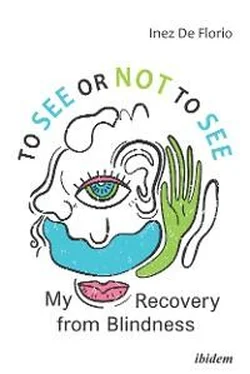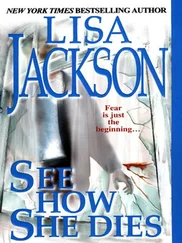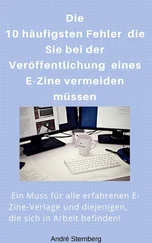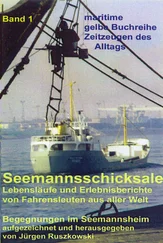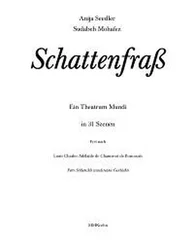ibidem-Press, Stuttgart
Contents
1 It is only with the heart that one can see rightly … (Antoine de Saint-Exupéry)
2 Best of Elvis
3 Blind is the one who refuses to see
4 Communication serves the proper self (Jens Wildenhain)
5 Love at first sight
6 Learning on the model
7 Colors, shapes and optical illusions
8 A crossing is a crossing is a crossing
9 The slightly different alphabetization
10 ‘Wrapping artist’
11 Jazz dance with open eyes
12 TV-listening with pictures
13 From the Eye Confusion Book to the Yearbook
14 Summary: seeing with all senses
View to the sky
Notes
1 It is only with the heart that one can see rightly … (Antoine de Saint-Exupéry)
Self-awareness is your awareness of the world, which you experience through the five senses (sound, touch, sight, taste, and smell). Pay attention to your sensory impressions and be aware of those five ways that the world comes to you.
Deepak Chopra
I hope readers will consider, especially in this age of the World Wide Web, that as miraculous as it is, we still need to be in the same room with all five senses if we are to empathize with each other.Gloria Steinem
I don’t remember the exact point in time because at the beginning I didn’t attach much importance to this information. It must have been toward the end of the 1980s when Marco, my husband, mentioned various times that it was by then possible to correct even severe visual impairment through surgery. He had read that Russian surgeons had developed a treatment that enabled patients with complex vision problems and even blind people to see.
“And how do they reach that?”
“If I got it right”, replied Marco, “they extract the patient’s own lenses with the help of particular devices and replace them by plastic lenses.”
My skepticism remained, even though the news should have given me a glimmer of hope. For outsiders, my rather hostile attitude is certainly difficult to comprehend, because I was severely visually impaired since birth. Long ago, I had reconciled myself to my blindness. Certainly, many things were awkward and time-consuming, and I was dependent on outside help, especially from Marco. But I was sufficiently compensated for this—at least in my view. My other senses, especially hearing and touch, were far more developed than with many people in possession of their sight.1 And they still are: Even nowadays, when preparing a pizza, I don’t limit myself to have a look through the window of the oven. I open it and orient myself to the smell and above all to the sizzle. I pay most attention to what I hear, that is to the heartbeat of the pizza.
The better development of the existing senses is due to the fact that parts of the brain that are actually designed for seeing take over other tasks in the neural network. Almost all persons born blind or those who went blind at an early age report this phenomenon which is confirmed by a steadily growing number of neurobiologists. For example, Beau Lotto describes the case of a blind boy who uses so-called echolocation to orient himself: He manages to identify individual surroundings and objects by clicking his tongue. Because of the echo, he knows where he is and what objects are in front of him.2
Until that time, I had not wished to be able to see. To put it clearly, I never gave it a thought. Many years later, I noticed on the basis of some inquiries that I was no exception. Most people who had been blind since birth and those who had lost their sight very early felt no shortage and were doing quite well in everyday life.3 As an example, the story of Saliya Kahawatte, a German whose father came from Senegal, may serve. In his novel Mein Blind Date mit dem Leben ( My Blind Date with Life ), which was turned into a movie in 2017, he tells in detail how he managed over years to hide his severe visual impairment, a retinal detachment, from his environment.4 For me it was easy to identify myself with his narratives, because I had developed similar behaviors. I avoided talking to outsiders—that is all those whom I had no regular contact with—about my vision problems. What for? Would they really have understood my particular difficulties? How might they have treated me after my confession? When he suffers a severe breakdown Kahawatte decides to deal overtly with his blindness. He is quite successful in arranging his private as well as his professional life. He writes that he is at peace with himself, reaches his goals and enjoys every day.5
A similar mindset requires will-power and perseverance. At various times well-intentioned caretakers tried to convince Saliya Kahawatte to work in the fabrication of brooms, the usual occupation of blind people. Even nowadays you can find ads on the internet that offer brushes and brooms handmade by blind people. Saliya resisted successfully. He traces similar advices back to the fact that sighted people very rarely are able to put themselves in the position of a blind person, mainly because they lack the necessary contacts.
As indicated above I can identify quite well with what he himself is telling. In his private life he keeps his vision problems even nowadays mostly to himself—for various reasons. The main reason is the insecurity most sighted people manifest when in contact with a blind person. When he says: ‘I’m visually impaired’ or ‘I’m almost blind’ they don’t know how to deal with his revelation. They react upset, full of compassion, with sadness or deeply embarrassed. They want to help, but show it in an awkward manner. Most of them are tensed up. He doesn’t want to blame them for their behavior; there are many reasons for it. It is caused by the fact that sighted and blind persons don’t have occasion to meet. They are separated since childhood; they frequent different schools, often even different nursery schools. He considers this as plain madness.6
Unfortunately, inclusive schooling of children who are visually impaired or suffer from an impairment of one of the other senses remains wishful thinking despite the UN Disability Rights Convention. Most schools lack the necessary preconditions or equipment. In consequence there are quite curious misjudgments of sighted people with regards to the blind. A blind blogger, a man at the beginning of his forties, tells about a memorable encounter in a subway-train in Munich.7 A younger woman gets seated in front of him and converses with him about his personal conditions. All at once, the lady asks him in the overcrowded train quite loud: “Tell me, please, do blind people have sex?” The other passengers seated or standing near them prick up their ears. The blind blogger, acquainted to this type of questions, answers without reserve: “Sure, if you want to, we can try it out immediately.” No wonder that the woman does not reply, but leaves the train at the next stop.
In general, it is not astonishing that only very few people who were born blind or went blind in their early childhood consider surgery, even though quite difficult interventions have become more and more successful in the 21st century. Saliya Kahawatte, too, sees no necessity to take an operation into account. Following his feelings, an intervention would be nothing but stress. Perhaps the newly reached vision together with his extraordinarily developed touch, hearing and taste would give him the total insight. He finds this idea quite bizarre.8
Much further than Kahawatte goes Isaac Lidsky, the CEO of a great U.S. enterprise. At the beginning of a TED Talk, Lidsky exposes five assumptions about his person asking the public to reflect which ones are true and which ones are invented.9 The fourth assumption is: ‘I lost my sight caused by a rare, genetically motivated eye disease.’ As Lidsky shows no signs of blindness—he opens his blind person’s cane only later on—many of the participants are convinced that he could not be blind. Already this beginning of his talk proves the exceptional attitude of Lidsky toward his stroke of fate.
Читать дальше
